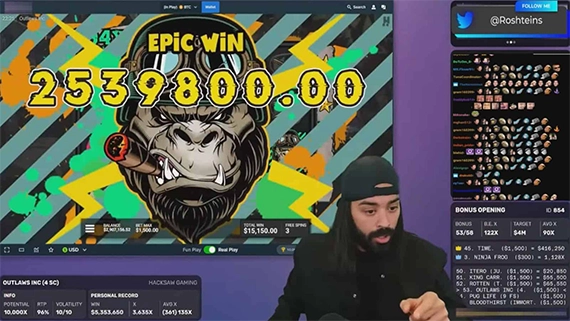How Streamers Make Money Off Casinos (And How You Can Too)

Business is booming for casino streamers. Is it weird that people watch other people gambling for fun? Like, instead of a movie or a TV show? Maybe, but it has gone viral, and we mean that literally.
We aren’t talking about a few viewers. No, we are talking about hundreds of thousands of viewers who tune in on Twitch, YouTube, and Kick to watch other people spin slot machines and flip cards. And the streamers that pull in huge audiences, which for some is in the millions? It’s not only for fun—they’re making bank with sponsorships, affiliate deals, and a whole lot more. It’s a whole career for them.
How do casino streamers do it? And how can you do it? We’ll tell you all about it, like the main revenue streams, which are brand sponsorships to affiliate links, and the caveats of going into the casino streaming biz. We’ll also give you a step-by-step guide on how to launch your very own casino stream, plus a few tips on growing your channel organically.
The Business of Casino Streaming
Casino streaming is so much more than watching a person gamble. It’s a whole business model that’s built on audience engagement, trust, and multiple income channels. First up, we have to unpack what casino streaming is, why people watch it, and how platforms like Twitch and Kick have fueled its rise.
What Is Casino Streaming? Entertainment, Community, Big Wins
Casino streaming is just playing games live for an audience. It’s just like watching someone play a video game, but they’re gambling instead. It’s broadcast online live, and the streamers fire up a slot machine, live dealer table, or any gambling game, and they share every spin, card flip, win, and loss via a webcam and game screen.
What makes this fun to watch? The streamer interacts with the chat, narrates their strategy, and reacts to the outcomes. It’s like a live podcast meets game show, with real money on the line. The top Twitch streamers for casino games draw millions of viewers who love to tune in and watch streamers try their luck.
The streamer provides the entertainment: by talking through the game, cracking jokes, or just keeping it interesting during repetitive gameplay; it’s a show, and the streamer is the host. Some streamers have giveaways or community challenges so that their viewers feel involved.
Why Viewers Love Gambling Content: Drama, Community, Thrill
Why are viewers glued to casino streams?
- For one, it’s live drama. Every slot spin and card flip is unpredictable. One second, the streamer could hit a jackpot; the next? They lose it all. Viewers get a front-row seat to that. The unpredictability of casino games keeps viewers so engaged because it’s suspenseful.
- Second, the community it builds. Casino streams turn viewers into active participants. There’s a live chat where people hype each other up or share grief after a loss, kinda like fans in a stadium, and this sense of belonging is powerful. It feels like they’re hanging out with friends at a casino table, but it’s online.
- Third? Education and strategy. Believe it or not, a lot of people tune in to learn about gambling. A lot of the streamers double as informal teachers, and they explain game mechanics or betting strategies as they play. And insider knowledge is great for curious fans. The top 5 casino streamers all break down odds and strategies live, and that makes their channel a crash course in casino games. Viewers are entertained and get tips on how to play.
And then there’s the aspirational dreaming aspect. Watching someone else win is vicarious fun, and seeing real money change hands live is captivating. It’s the combo of educational, communal, and edge-of-your-seat excitement that keeps audiences coming back.
Twitch, Kick, & YouTube: Platforms, Policies, Payouts
As for streaming platforms, Twitch is the undisputed king of live casino content. Originally, it was all video games, but Twitch has expanded into every niche, which includes gambling.

Twitch hosts countless casino streamers because it has the tools, like live chat, subscriptions, and alerts, as well as a built-in gaming audience. Its interactive features (polls, chat reactions) suit casino streams perfectly.

Kick is the newer kid on the scene, but it has quickly become a magnet for casino streamers. It has super streamer-friendly policies and relaxed rules on gambling content (compared to, say, Twitch’s crackdown). Kick was designed with these niches in mind, so it’s obvious why so many casino streamers have migrated there.
But Kick still enforces certain legal safety checks—the platform requires that any gambling streams originate from regions where online gambling is legal, and it forbids using viewers’ money for bets (no sweepstakes buy-ins). But by and large, Kick has become a hub for casino streams because it welcomes them.

YouTube rounds out the streaming trio. A lot of casino streamers use YouTube to archive videos and highlights. It isn’t usually for live chat, but it offers global reach and ad revenue. A streamer can play on Twitch or Kick live, and then post the edited highlights on YouTube for extra views and ad money. It’s an ecosystem approach: live on one platform, clips on another.
Main Revenue Streams for Casino Streamers
Casino streamers pull in cash from multiple angles. Below, we break down the big four: casino sponsorships, affiliate links/rev-share, bonuses/free funds, and fan-driven income (merch, tips, subs). Together, they all make streaming a profitable endeavor.
🎰 Sponsorship Deals From Casinos
One of the biggest payday options is direct sponsorship. In these types of deals, a casino (or gaming brand) pays a streamer to feature their site. It could be a flat fee or an entire “takeover” stream. The casino is buying exposure, and the streamer includes logos, talks up bonus codes, or hosts giveaway sessions that are funded by the casino.
Casinos might pay for in-stream ad placements, dedicated episodes, or branded promotions. A casino could offer a streamer $5,000 or more per month just to play on their platform and mention it regularly, and some of the top streamers command six-figure sponsorships for big events.
The streamer thus becomes an influencer in the casino’s marketing plan, and the sponsored sessions not only cover streaming costs but also come with additional perks like covering bet losses or exclusive bonus codes for viewers.
Sponsorships are the “paid commercials” of streaming, as casinos are literally sponsoring a game show-style gambling session, a streamer plugs the brand.
💸 Affiliate Links & RevShares
If sponsorships are the upfront deals, affiliate marketing is the ongoing money machine. Nearly all serious casino streamers carry affiliate links or codes from casinos. When viewers click on those links and play, the streamer earns commission.
Typically, there are two main commission styles: Revenue Share (RevShare) and CPA (Cost Per Acquisition).
- RevShare means the streamer gets a cut (usually 20–50%) of the net revenue the casino makes from the referred players. If your viewers bet $10,000 in a month and lose $5,000, and you have a 30% RevShare deal, you’d earn $1,500 that month.
- CPA pays a flat fee for each new depositing player (say $50 per new customer, no matter how much they wager after). Most deals combine both—a smaller CPA plus some percentage of RevShare.
Affiliate programs are the scoreboard: streamers share their link/code, viewers sign up, and the casino reports back the activity. The affiliate model allows affiliates to earn by directing their audience to specific sites, with the streamer getting a portion of the money the casino makes from those new users—it’s all performance-based. The more your viewers gamble on that site, the more you will earn. This rev-share structure means that the smartest streamers will create plenty of wagering, and the casinos get more traffic.
🎁 Bonuses & Free Balances
Another income multiplier comes from casino bonuses and “house money.” Casinos will offer streamers free bet balances or huge signup bonuses as part of sponsorship/affiliate deals.
The casino gives the streamer play-money (or a big bonus) to use on camera, and that’s money that the streamer doesn’t have to risk personally. This is great for content because it lets the streamer chase giant wins without losing their own moolah.
From the streamer’s point of view? They’re playing with monopoly money, and that encourages bigger bets and more exciting gameplay. But from a business angle, it’s smart marketing. The streamer appears to be gambling huge sums, drawing in viewers, but the casino is footing the bill.

The balances look real, but they can’t be withdrawn—they exist solely to make the action look authentic. The streamer is investing the casino’s money to pump up the show. For the streamer, it also lowers risk: if they lose that bonus, it’s not their real money on the line. In content terms, it creates a thrilling illusion of risk.
A warning: some viewers note that this creates a “house money” mindset, meaning that the streamer is less worried, and the audience can be misled about how safe the game is.
🎉 Merch, Donations & Subscriptions
In addition to casinos, streamers monetize directly from fans and their personal brand. Fans will send superchats/“bits” and donations while in the stream, which are small or large tips to say thanks or to influence the game!.

YouTube’s SuperChat or Twitch’s Bits allows viewers to toss a streamer a few bucks during gameplay. There are fans who sponsor a round or buy a gift subscription for the channel.
Then there are channel subscriptions. On Twitch, viewers can subscribe monthly (usually $5 or more) for perks like custom emotes or ad-free viewing, and streamers usually keep about $2–$2.50 of each tier 1 sub. Kick and YouTube have similar subscription features or “joining” options. So a loyal audience of even 100 subscribers can add hundreds of dollars each month. Merchandise is another trick: streamers launch branded T-shirts, hoodies, mugs, etc.
Together, the fan-driven channels (tips, subs, merch) will be smaller than any big casino deals, but they can add up and be a source of steady income. Popular streamers will tease it as “taking fan bets” or special shoutouts for donations. They form a reliable baseline income even in slow gambling months.
Behind the Scenes: Is It All Real?
Okay, so are these casino streams genuine? Do streamers play with their own money? The truth here is it’s a bit of both, and transparency will differ by streamer.
Do Streamers Foot the Bill?
Some do use their own money, at least when they first launch their channel and can’t land deals before they get more viewers.
They fund their own bankroll (within limits) and literally gamble live for the wins and losses. In that case, what you are seeing on screen is exactly what they are risking in real life.
But the most popular streamers usually don’t have to use their personal funds for big bets. As we said, they can rely on casino-provided bonus balances or sponsored bankrolls. Practically speaking, if a streamer is paid by a casino, the casino can just credit the account, so every game they play is with the house’s money.
Are the Wins Fake?
Does that mean that all wins are fake? Nope, but sometimes that line can get blurry. There are critics who argue that because streamers aren’t risking their personal cash, it creates a misleading “safe gambling” vibe.
The Game Win Board video, which was an exposé on casino streamers, claims that most of the high-stakes streams are done with non-cash balances. They highlight that big wins get the view count up, and the streamer doesn’t lose anything since the balance isn’t cash out-able.
But that’s only one part of the story. The casinos require that streamers still have to play (no fake spins), and the streamers can’t just siphon off funds. The balance is real for playing purposes, but the streamer can’t withdraw it—it’s like playing with a voucher. It is indeed a promotional balance, designed solely to make the gameplay look authentic to viewers. If the streamer goes on a losing streak, that’s on the casino’s tab, not on some rigged game outcome.
The industry’s consensus is this: major streamers don’t collude on rigged outcomes because their reps are on the line, and viewers want transparency. Most of the high-profile streamers strive to be legit, as they hype up wins but also show their losses. If a streamer only ever shows massive hits and no tough breaks, fans would def smell something fishy.
Ethical Streaming
Yes, a lot of streamers are playing with promo money, but some of them won’t advertise that. Ethical streamers will say if a big spin is courtesy of a sponsor’s bonus. And the most responsible ones will stop to remind viewers that “this isn’t my own money” or that “all wins are hypothetical until you actually cash out.” Others are less clear, which is why some community watchdogs are watching them.
A telltale sign of honesty is this: live play and on-stream funding. Streamers who withdraw small amounts mid-stream to prove that a bankroll is real (and then keep playing with the rest) have nothing to hide. If you never see a withdrawal or constantly see the “balance” reset to a nice round number, that could be house money.
How You Can Start Casino Streaming: Step-by-Step
Want to try your hand at casino streaming? Here’s a roadmap to get you from zero to live. Follow the five steps below to pick a platform, find partners, and build up an audience:
Decide where you want to stream: Twitch, Kick, or YouTube are the main options. Twitch has the biggest audience and built-in tools (chat, subs, ads), but it has stricter gambling rules. Kick has friendly terms for gambling content and higher revenue shares for streamers, but a smaller audience. YouTube is great for reach and on-demand videos (clips and highlights), though live chat features aren’t an option. Consider where your target viewers hang out. Most slot streamers do Twitch for the live experience and archive on YouTube. If you’re just starting out, Twitch or Kick will most likely give you the best chance at chat engagement and earning (Kudos, Bits, etc.).
Pick well-known, licensed casinos that have affiliate deals. Research affiliate networks like Light & Wonder, SoftSwiss, or Relax Gaming—they let streamers sign up for affiliate terms. Look for the casinos that have good reviews, fast payments, and attractive affiliate splits. Sign up for their affiliate program or network, and you’ll get unique links/codes to share on stream. Streamers also use Spinomenal’s affiliate program. Make sure the casino is legal in your area and will appeal to your audience (slots, poker, live dealers). And test the gambling site first so that you can walk your viewers through it!
You don’t have to have a high-tech studio, but decent gear does matter. Get a reliable PC or console for playing, and a capture card if needed. A good microphone and webcam will make a big difference in quality. Viewers expect clear audio of your commentary and a good view of the game.
An LED ring light or two will help you look good on camera, too! Set up your streaming software, like OBS or Streamlabs, to capture your screen and camera. Design some channel graphics or overlays, or at least a simple frame and lower-third overlay with your webcam. Also, prepare panels or descriptions so that you can include your affiliate links. Good lighting and clean audio make your stream feel pro, and that will keep viewers around longer.
Planning your content is the most important part! Casino streaming isn’t just playing—you have to make it interesting so that viewers want to watch.
Have a betting goal with your slot game sessions, bonus hunt streams where you chase casino free spins or bonuses, or challenges like doing a high-roller bet after a chat vote. Engage viewers by reading their chat messages, reacting to their advice, or having them pick which game you should play next. Offer giveaways to encourage viewers to stay and click on those affiliate links. Branding also helps, so name your segments, use a catchy opening, or have a few signature phrases. Consistency in style and personality will build a loyal audience.
Once you’re live on a regular basis, you can apply to become an official affiliate or partner with the casinos that you chose. This requires a certain streaming time or viewer count, but some casinos have flexible affiliate tiers for new promoters.
Meanwhile, focus on growing your audience. Share your streams on social media (X, Instagram, TikTok clips), engage in casino communities, and maybe collaborate with other streamers. Use your affiliate links on all platforms and encourage viewers to “Use my link to sign up and we can play together!” The more you stream (on a schedule you can keep), the faster you’ll grow.
Starting out, your income will be small—maybe just a few affiliate sign-ups, ads, or donations. But after several months of streaming 2–3 times a week, you could start seeing steady affiliate commissions rolling in (especially if you bring in paying players). Keep refining your streaming style, and as your numbers grow, so will brand interest. It takes patience, but the streaming life is open to anyone with the passion and consistency to keep playing!
6 Tips to Grow and Monetize Your Casino Streaming Channel
Launching your stream is only the beginning—now you have to grow and monetize it. Below are some quick-hit tips for building a solid channel:
- Keep a Consistent Schedule: Stream on a regular timetable (e.g., Mon/Wed/Fri nights). Your viewers will know when to tune in. Consistency and quality are the two biggest factors in growth. Even if each session starts small, showing up reliably builds momentum. Consistency also signals to casinos and partners that you’re serious, and you’ll look like a safe bet for affiliate or sponsorship deals.
- Find Your Niche: Casino streaming is already a niche, but niche down further. Do you love high-stakes slots? Live blackjack? Joker Millions? Maybe focus on fun-themed slots and witty commentary, or deep dives into strategy. If viewers know what to expect, they’ll come back. Brian Christopher Slots is famous for high-limit slots, and others concentrate on bonus-hunt marathons. Identify your unique angle and lean into it.
- Build Trust and Transparency: Honesty is currency, so always be upfront about when you’re using affiliate bonuses or house money. Tell viewers why you chose a casino or how bonuses work; education builds trust. Streamers who openly chat about bankroll limits and risk create loyal fans. Promoting responsible gambling is a must, so set a good example by saying things like, “Only play what you can afford to lose.” This not only keeps you legit, it endears viewers to you. A rep for fairness will pay off in word-of-mouth.
- Follow Platform Rules and Compliance: Make sure to obey all platform guidelines. Twitch, Kick, and YouTube have rules about casino content and affiliate links. Twitch bans unlicensed gambling content and shares, cracked down on unauthorized sites, and Kick requires age verification. Read the community guidelines so that you don’t accidentally get banned. Also, mind the geo-restrictions: Some countries prohibit streaming gambling at all, so only stream where it’s legal. Following the rules protects you long-term, and losing a channel over a technicality would kill all of your hard work and progress.
- Engage Your Audience Beyond the Stream: Build a community outside of your streaming platform. Create a Discord server or Telegram group for your fans to hang out. Post stream highlights on Instagram, X, or TikTok. Let followers vote on your next game or suggest some challenges. Social media grows your brand and keeps fans connected on off-days. The stronger your community (even off-stream), the more resilient your channel will be.
- Leverage Other Features: Try all of the tools at your disposal, like YouTube Short clips of your best wins, custom VIP roles in chat, fun chat games (like lottery pools where viewers guess spin outcomes), and channel points rewards. Small touches keep viewers engaged and liking your streams. The longer people stay, the more ad revenue and subscriber revenue you earn (and the more chances you have to spread those affiliate links).
Legal and Ethical Considerations
Streaming casino games isn’t all fun and games! There are a lot of rules and responsibilities. The following is what you need to know so that you stay on the right side of the law and ethics:
- Platform Rules: Each streaming site has its own gambling policies. Twitch famously banned most unregulated gambling content as of 2022. That means if you stream on Twitch, you can only use licensed casinos and no “sweeps” or crypto casinos unless they are fully regulated. Kick initially let a lot of casino streams play wherever, but they implemented stricter age-check rules. Make sure you’re in a jurisdiction where online gambling is legal—Kick explicitly requires your stream location to allow it. Always read the current guidelines for your platform (they can and do change).
- Geographic Restrictions: Even if the platform allows it, local laws might not. Only stream from countries or states that permit online casino games. Also, there are countries that block gambling sites, so your affiliate links could be region-locked. Use geo-aware links if possible. For the most ethical approach, advise your viewers, “This casino doesn’t operate in every country, so check your local laws.”
- Disclosures and Transparency: Most regions require that you disclose affiliate links and sponsorships. That means you have to verbally say “Paid partnership with CasinoX” when you’re streaming a sponsored session. Make it obvious if you’re earning a commission on a game. Not only is it legally required in many places, but it’s just the right thing to do. Viewers appreciate honesty, and hiding your affiliate tie looks deceptive.
- Promote Responsible Gambling: It is more than possible to promote responsible play without making the stream boring. Take short breaks to remind viewers, “Remember, this is for fun, and never bet more than you can lose.” Be casual about it and throw in a chat poll about setting a losing limit, or talk about your own budget rule. It won’t kill the vibe; it shows that you care about your fans. Because if a viewer goes off and bets recklessly because they thought, “The streamer I watch made millions—maybe I can too,” that’s on you. Create an open atmosphere: “I’m about to play with bonus funds. I’m not playing with my rent money!”
Real Earnings Examples: How Much Can You Make?
Okay, so what can you realistically earn if you are a casino streamer? And how long till you see a profit?
The Big Dogs

For mega-stars, the sky’s the limit. The most popular casino streamers can pull in six or seven figures annually from combined revenue streams. Trainwreckstv claimed to have earned over $360 million from his gambling streams, though even he admitted the figure was staggering and was met with some skepticism. Whether it’s true or embellished, it signals how lucrative things can get at the top. Others like Roshtein (1.1M Twitch followers ) and xQc (12M YouTube subs and a massive viewership) earn huge from a combo of sponsorships, ads, and affiliate rev-share.
For budding streamers, starting earnings are way more modest. Small streamers (a few dozen to a couple hundred viewers) might pull in only a few hundred dollars per month at first. Sources say that small-to-medium Twitch streamers generally make about $250–$3,000 per month on average (that’s including subs, bits, ads, and any affiliates). Much of that is from fan support. On top of that, a beginner might see a trickle of affiliate income: maybe one or two paying players a month. If five of your viewers each lose $100 on a linked casino, and you have a 25% RevShare deal, that’s about $125 extra.
Mid-tier streamers (100–500 average viewers) can earn several thousand per month once affiliated properly. If you have 200 viewers, and 20 of them gamble $50 each month through your link, that’s $1,000 of losses, and you have a 30% share, so it’s $300 monthly from affiliates alone.
Add in subs (200 viewers might yield 20 subscribers at $2 each = $40), ads, and maybe one sponsorship or large tip each month, and you’re into the low thousands. A lot of mid-tier streamers report monthly affiliate checks in the $500–$2000 range once they get some traction. Affiliate income scales with audience gambling volume, not only viewer count.
The first year is usually pretty slow, and you’ll more than likely invest more (buy equipment, pay for casino deposits) than you earn. By the end of year 1, a diligent streamer might break even or see a small profit (a few hundred dollars/month) if they hustle. If you stick it out, consistency pays off. By year 2–3, growth compounds. Audiences grow, and with them, affiliate earnings. A dedicated streamer hitting 300–500 regulars by year 3 could feasibly make $3,000–$5,000+ per month from combined income streams (maybe more with sponsorships). If a streamer reaches 500 active bettors, each betting $50/month, at 30% rev share, = $7,500 on affiliate alone. Sponsor deals and fan support would be the icing on that money cake.
The smaller streamers say that the gameplay itself isn’t the big earner—the promotions are. Most of your cash will come from affiliate splits and sponsorships, not from winning the games. The gameplay is the bait that catches your viewers; the affiliate link is the hook that pays you. If you plan to start streaming, concentrate early on building affiliate relationships.
Case Studies
– Small-time Steve: Streams slots on Twitch twice a week, has ~50 viewers. After 6 months, he got 3 players signing up per month (at $30 CPA each) plus $200 from donations. He made about $100/month from streams, which was enough to cover some casino deposits.
– Larger Louise: After 1 year, she averaged 300 viewers, 30 subs, and got a 35% rev share with a popular casino. When 50 of her viewers bet $200 each in a month, that was $3,500 of wagers, earning her about $1,225 from affiliates, plus $1500 from subs/donations. She could quit her part-time job.
– Top Twitch Trainwreck: Boasts 2 million followers and has several income lines, with a rumored $ 300 M+ career earnings largely via affiliate and sponsorship. He’s an extreme example, but it shows how big it can get.
Conclusion: Wanna Be the Next Big Casino Streamer? Start Here
Turning gambling into an income (other than winning) is absolutely possible, but it takes work, honesty, and a fair amount of luck. Casino streaming is profitable, but it’s also super competitive.
Any tangible earnings will come from affiliates and sponsors, unless you happen to hit it big. Everyone starts with almost no audience, so you have to be diligent and consistent to build it. How? By showing up, making fun and relatable content, and engaging with your viewers. Being transparent, which means no shadiness and responsibility, while also promoting responsible gambling, will help you build up a loyal community.
And last but not least, pick your streaming platform and the casino you partner up with wisely—it’ll help you maximize your earnings and keep you on the right side of the rules!
Here’s a quick roundup on how casino streamers make money, and how you can get into the biz:
- Casino streaming is really profitable for some, but it’s a super competitive niche.
- Almost all earnings come from affiliate deals and sponsorships, not from winning casino games.
- You can start out small with a couple of viewers, but building trust and consistency is the most important thing for growing your viewership.
- Don’t ever mislead your viewers. Transparency about money, risks, and promos will always win out.
- Be smart about platform rules and your audience’s location, and choose legit and reputable casinos.
You’ve got the inside scoop, so if you want to hit “Start” on a casino streaming venture, you can do it!

Alyssa contributes sportsbook/online casino reviews, but she also stays on top of any industry news, precisely that of the sports betting market. She’s been an avid sports bettor for many years and has experienced success in growing her bankroll by striking when the iron was hot. In particular, she loves betting on football and basketball at the professional and college levels.








